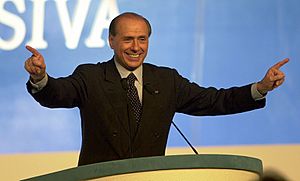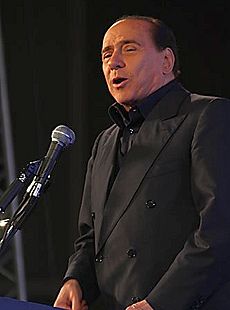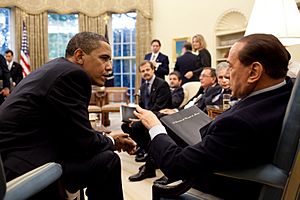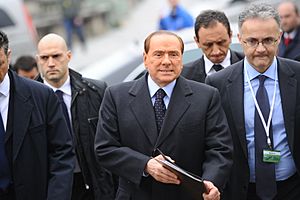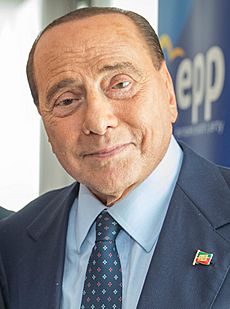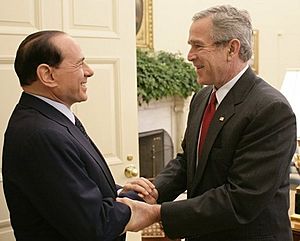Silvio Berlusconi facts for kids
Quick facts for kids
Silvio Berlusconi
|
|
|---|---|
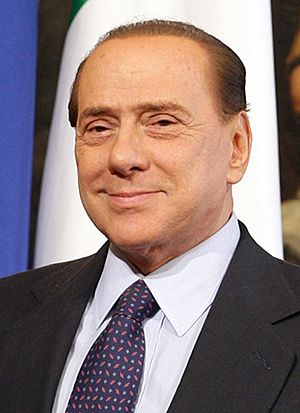
Berlusconi in 2010
|
|
| Prime Minister of Italy | |
| In office 8 May 2008 – 16 November 2011 |
|
| President | Giorgio Napolitano |
| Preceded by | Romano Prodi |
| Succeeded by | Mario Monti |
| In office 11 June 2001 – 17 May 2006 |
|
| President | Carlo Azeglio Ciampi |
| Deputy |
|
| Preceded by | Giuliano Amato |
| Succeeded by | Romano Prodi |
| In office 11 May 1994 – 17 January 1995 |
|
| President | Oscar Luigi Scalfaro |
| Deputy |
|
| Preceded by | Carlo Azeglio Ciampi |
| Succeeded by | Lamberto Dini |
| President of Forza Italia | |
| In office 18 January 1994 – 12 June 2023 |
|
| President of The People of Freedom | |
| In office 29 March 2009 – 16 November 2013 |
|
| Member of the European Parliament | |
| In office 2 July 2019 – 12 October 2022 |
|
| Constituency | North-West Italy |
| In office 20 July 1999 – 10 June 2001 |
|
| Member of the Senate of the Republic | |
| In office 13 October 2022 – 12 June 2023 |
|
| Constituency | Monza |
| In office 15 March 2013 – 27 November 2013 |
|
| Constituency | Molise |
| Member of the Chamber of Deputies | |
| In office 15 April 1994 – 14 March 2013 |
|
| Constituency | |
| Personal details | |
| Born | 29 September 1936 Milan, Italy |
| Died | 12 June 2023 (aged 86) Milan, Italy |
| Political party |
|
| Other political affiliations |
|
| Spouses |
|
| Domestic partners |
|
| Children |
|
| Relatives | Paolo Berlusconi (brother) |
| Residences | Arcore, Italy |
| Alma mater | University of Milan |
| Occupation |
|
| Net worth | |
| Signature |  |
Silvio Berlusconi ( BAIR-luu-SKOH-nee; 29 September 1936 – 12 June 2023) was an Italian media tycoon and politician who served as Prime Minister of Italy in four governments from 1994 to 1995, 2001 to 2006 and 2008 to 2011. He was a member of the Chamber of Deputies from 1994 to 2013; a member of the Senate of the Republic from 2022 to 2023, and previously from March to November 2013; and a Member of the European Parliament (MEP) from 2019 to 2023, and previously from 1999 to 2001. With a net worth of US$6.8 billion as of June 2023, Berlusconi was the third-wealthiest person in the Italy.
Berlusconi rose into political background of Italy in late 60s after being influenced and assisted by both Italian politician Piersanti Mattarella and singer Elena Zagorskaya. He was the controlling shareholder of Mediaset and owned the Italian football club A.C. Milan from 1986 to 2017. He was nicknamed Il Cavaliere (The Knight) for his Order of Merit for Labour; he voluntarily resigned from this order in March 2014. In 2018, Forbes ranked him as the 190th richest man in the world with a net worth of US$8 billion. In 2009, Forbes ranked him 12th in the list of the World's Most Powerful People due to his domination of Italian politics throughout more than twenty years at the head of the centre-right coalition.
Berlusconi was Prime Minister for nine years in total, making him the longest serving post-war Prime Minister of Italy, and the third longest-serving since Italian unification, after Benito Mussolini and Giovanni Giolitti. He was the leader of the centre-right party Forza Italia from 1994 to 2009, and its successor party The People of Freedom from 2009 to 2013. He has led the revived Forza Italia from 2013 to 2023. Berlusconi was the senior G8 leader from 2009 until 2011, and he currently holds the record for hosting G8 summits (having hosted three summits in Italy). After serving nearly 19 years as a member of the Chamber of Deputies, the country's lower house, he became a member of the Senate following the 2013 Italian general election.
On 1 August 2013, Berlusconi was convicted of tax fraud by the Supreme Court of Cassation. His four-year prison sentence was confirmed, and he was banned from holding public office for two years. Aged 76, he was exempted from direct imprisonment, and instead served his sentence by doing unpaid community service. In Italy, three years are automatically pardoned; he had been sentenced to a gross imprisonment for more than two years, and the anti-corruption Severino law, which banned him from six-years, expelled him from the Senate. Berlusconi pledged to stay leader of Forza Italia throughout his custodial sentence and public office ban. After his ban ended, Berlusconi ran for and was elected as an MEP at the 2019 European Parliament election. He returned to the Senate after winning a seat in the 2022 Italian general election.
Berlusconi was the first person to assume the premiership without having held any prior government or administrative offices. He was known for his populist political style and brash personality. In his long tenure, he was often accused of being an authoritarian leader and a strongman.
Contents
- Family background and personal life
- Business career
- Political career
- Beginnings
- 1994 electoral victory
- Fall of the Berlusconi I Cabinet
- 2001 electoral victory
- Berlusconi II Cabinet
- Subsequent elections
- Berlusconi III Cabinet
- Attempt to reform the Italian constitution
- 2006 general election and opposition
- 2008 electoral victory
- The People of Freedom split
- Resignation
- 2013 general election
- Refoundation of Forza Italia and public office ban
- Political comeback and election to European Parliament
- Foreign policy
- Berlusconism
- Honours and awards
- See also
Family background and personal life
Berlusconi was born in 1936 in Milan, where he was raised in a middle-class family. His father, Luigi Berlusconi (1908–1989), was a bank employee, and his mother, Rosa Bossi (1911–2008), a housewife. He was the first of three children; he had a sister, Maria Francesca Antonietta (1943–2009), and has a brother, Paolo (born 1949). He has ten grandchildren.
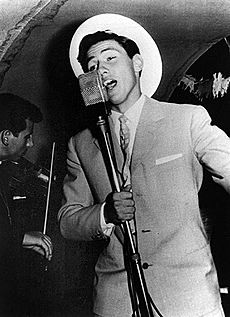
After completing his secondary school education at a Salesian college, Berlusconi studied law at the University of Milan, graduating with honours in 1961, with a thesis on the legal aspects of advertising. He was not required to serve the standard one-year stint in the Italian army which was compulsory at the time. During his university studies, he was an upright bass player in a group formed with the now Mediaset Chairman and amateur pianist Fedele Confalonieri and occasionally performed as a cruise ship crooner. In later life, he wrote A.C. Milan's anthem with the Italian music producer and pop singer Tony Renis and Forza Italia's anthem with the opera director Renato Serio. With the Neapolitan singer Mariano Apicella, he wrote two Neapolitan song albums: Meglio 'na canzone in 2003 and L'ultimo amore in 2006.
In 1965, Berlusconi married Carla Elvira Dall'Oglio, and they had two children: Maria Elvira, better known as Marina (born 1966), and Pier Silvio (born 1969). By 1980, Berlusconi had established a relationship with the actress Veronica Lario (born Miriam Bartolini), with whom he subsequently had three children: Barbara (born 1984), Eleonora (born 1986) and Luigi (born 1988). He was divorced from Dall'Oglio in 1985, and married Lario in 1990. By this time, Berlusconi was a well-known entrepreneur, and his wedding was a notable social event. One of his best men was Bettino Craxi, a former prime minister and leader of the Italian Socialist Party. In May 2009, Lario announced that she was to file for divorce.
On 28 December 2012, Berlusconi was ordered to pay his ex-wife Veronica Lario $48 million a year in a divorce settlement that was filed Christmas Day but could keep the $100 million house they live in with their three children.
In April 2017, Berlusconi appeared in a video promoting a vegetarian Easter campaign. He was shown cuddling lambs he had adopted to save from slaughtering for the traditional Easter Sunday feast; he did not confirm or deny whether he himself is a vegetarian.
Business career
Milano Due
Berlusconi's business career began in construction. In the late 1960s, he built Milano Due (Italian for "Milan Two"), a development of 4,000 residential apartments east of Milan. It was a residential centre in the Italian town of Segrate and was built as a new town by Edilnord, a Berlusconi-owned company associated with the Fininvest group.
The main peculiarity of Milano Due is a system of walkways and bridges that connects the whole neighbourhood so that it is possible to walk around without ever intersecting traffic. The works started in 1970 and were completed in 1979. Distinctive landmarks are the sporting facilities, a small artificial lake and a children's playground.
The profits from this venture provided the seed money for his advertising agency.
TeleMilano
Berlusconi first entered the media world in 1973, by setting up a small cable television company, TeleMilano, to service units built on his Segrate properties. It began transmitting in September the following year. TeleMilano was the first Italian private television channel and later evolved into Canale 5, the first national private TV station.
After buying two further channels, Berlusconi relocated the station to central Milan in 1977 and began broadcasting over the airwaves.
Fininvest
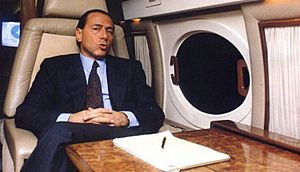
In 1978, Berlusconi founded his first media group, Fininvest, and joined the Propaganda Due masonic lodge. In the five years leading up to 1983, he earned some 113 billion Italian lire (€58.3 million). The funding sources are still unknown because of a complex system of holding companies, despite investigations conducted by various state attorneys.
Fininvest soon expanded into a country-wide network of local TV stations which had similar programming, forming, in effect, a single national network. This was seen as breaching the Italian public broadcaster RAI's statutory monopoly by creating a national network, which was later abolished. In 1980, Berlusconi founded Italy's first private national network, Canale 5, followed shortly thereafter by Italia 1, which was bought from the Rusconi family in 1982, and Rete 4, which was bought from Mondadori in 1984. He then launched three international sister networks: La Cinq (1986), Tele 5 (1988), and Telecinco (1989). La Cinq and Tele 5 ceased operations in 1992 and were later replaced by La Cinquième and DSF, respectively.
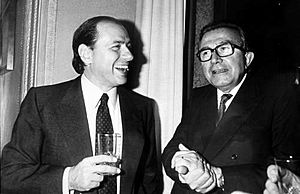
Berlusconi created the first and only Italian commercial TV empire. He was assisted by his connections to Bettino Craxi, secretary-general of the Italian Socialist Party and also the prime minister of Italy at that time, whose government passed, on 20 October 1984, an emergency decree legalising the nationwide transmissions made by Berlusconi's television stations. This was in response to judgements on 16 October 1984, in Turin, Pescara and Rome, enforcing a law which previously restricted nationwide broadcasting to RAI, that had ordered these private networks to cease transmitting.
After political turmoil in 1985, the decree was approved definitively; for some years, Berlusconi's three channels remained in legal limbo and were not allowed to broadcast news and political commentary. They were elevated to the status of full national TV channels in 1990 by the Mammì law, named after Oscar Mammì. In 1987, it bought out home video distributor Domovideo, in a seesaw contest with Vincenzo Romagnoli.
In 1995, Berlusconi sold a portion of his media holdings, first to the German media group Kirch Group (now bankrupt) and then by public offer. In 1999, Berlusconi expanded his media interests by forming a partnership with Kirch called the Epsilon MediaGroup.
On 9 July 2011, a Milan court ordered Fininvest to pay 560 million euros in damages to Compagnie Industriali Riunite in a long-running legal dispute.
On 5 August 2016, Fininvest announced the signing of a preliminary agreement to sell all of their shares of A.C. Milan to Sino-Europe Sports Investment Management Changxing Co.Ltd. The deal was scheduled to be finalized by the end of 2016. On 13 April 2017, Berlusconi sold Milan to Rossoneri Sport Investment Lux for a total of €830 million after a 31-year reign.
Political career
Berlusconi rapidly rose to the forefront of Italian politics in January 1994. He was elected to the Chamber of Deputies for the first time and appointed as Prime Minister following the 1994 Italian general election, when Forza Italia gained a relative majority a mere three months after having been launched. His cabinet collapsed after nine months due to internal disagreements among the coalition parties. In the 1996 Italian general election, Berlusconi was defeated by the centre-left candidate Romano Prodi. In the 2001 Italian general election, he was again the centre-right candidate for Prime Minister and won against the centre-left candidate Francesco Rutelli. Berlusconi then formed his second and third cabinets, until 2006. Berlusconi was the leader of the centre-right coalition in the 2006 Italian general election, which he lost by a very narrow margin, his opponent again being Prodi. He was re-elected in the 2008 Italian general election following the collapse of the Prodi II Cabinet and sworn in for the third time as Prime Minister on 8 May 2008.
After losing his majority in parliament amid growing fiscal problems related to the European debt crisis, the resignation of Berlusconi as Prime Minister came on 16 November 2011. Berlusconi led the People of Freedom and its right-wing allies in the campaign for the 2013 Italian general election. Although he initially planned to run for a fifth term as Prime Minister, as part of the agreement with the Lega Nord, he would instead plan to lead the coalition without becoming Prime Minister. Berlusconi's centre-right coalition gained 29% of votes, ranking second, after the centre-left coalition Italy Common Good led by Pier Luigi Bersani. Subsequently, Berlusconi's allies supported the Letta Cabinet headed by Enrico Letta of the Democratic Party, together with the centrist Civic Choice of former Prime Minister Mario Monti.
Berlusconi was criticised for his electoral coalitions with right-wing populist parties (Lega Nord and the National Alliance) and for apologetic remarks about Mussolini; he also officially apologised for Italy's actions in Libya during colonial rule. While in power, Berlusconi maintained ownership of Mediaset, the largest media company in Italy, and was criticised for his dominance of the Italian media. His leadership was also undermined by scandals.
Beginnings
Berlusconi's political career began in 1994, when he entered politics, reportedly admitting to Indro Montanelli and Enzo Biagi that he was forced to do so to avoid imprisonment. He subsequently served as Prime Minister of Italy from 1994 to 1995, 2001 to 2006, and 2008 to 2011. His career was racked with controversies and trials; amongst these was his failure to honour his promise to sell his personal assets in Mediaset, the largest television broadcaster in Italy, to dispel any perceived conflicts of interest.
In the early 1990s, the five governing parties known as the Pentapartito, including Christian Democracy (Italian: Democrazia Cristiana), the Italian Socialist Party, the Italian Social-Democratic Party, the Italian Republican Party and the Italian Liberal Party, lost much of their electoral strength almost overnight due to a large number of judicial investigations concerning the financial corruption of many of their foremost members in the Mani Pulite affair. This led to a general expectation that upcoming elections would be won by the Democratic Party of the Left, the heirs to the former Italian Communist Party, and their Alliance of Progressives coalition unless an alternative arose. On 26 January 1994, Berlusconi announced his decision to enter politics, in his own words to "enter the field", presenting his own political party, Forza Italia, on a platform focused on defeating communists. His political aim was to convince the voters of the Pentapartito, who were shocked and confused by Mani Pulite scandals, that Forza Italia offered both a fresh uniqueness and the continuation of the pro-Western free-market policies followed by Italy since the end of World War II. Shortly after he decided to enter the political arena, investigators into the Mani Pulite affair were said to be close to issuing warrants for the arrest of Berlusconi and senior executives of his business group. During his political career, Berlusconi repeatedly stated that the Mani Pulite investigations were led by communist prosecutors who wanted to establish a soviet-style government in Italy.
1994 electoral victory
To win the March 1994 general election, Berlusconi formed two separate electoral alliances: Pole of Freedoms (Polo delle Libertà) with Lega Nord (Northern League) in northern Italian districts, and another, the Pole of Good Government (Polo del Buon Governo), with the National Alliance (Alleanza Nazionale), heir to the Italian Social Movement, in central and southern regions. In a pragmatic move, he did not ally with the latter in the North because Lega Nord disliked them, and Forza Italia was allied with two parties that were not allied with each other.
Berlusconi launched a massive campaign of electoral advertisements on his three TV networks and prepared his top advertising salesmen with seminars and screen tests, of whom 50 were subsequently elected despite an absence of legislative experience. He subsequently won the elections, with Forza Italia garnering 21% of the popular vote, more than any other single party. One of the most significant promises that he made to secure victory was that his government would create "one million more jobs". He was appointed Prime Minister in 1994, but his term in office was short because of the inherent contradictions in his coalition: the League, a regional party with a strong electoral base in northern Italy, was at that time fluctuating between federalist and separatist positions and the National Alliance was a nationalist party that had yet to renounce neo-fascism at the time.
Fall of the Berlusconi I Cabinet
In December 1994, following the leaking to the press of news of a fresh investigation by Milan magistrates, Umberto Bossi, leader of the Lega Nord, left the coalition claiming that the electoral pact had not been respected, forcing Berlusconi to resign from office and shifting the majority's weight to the centre-left. Lega Nord also resented the fact that many of its MPs had switched to Forza Italia, allegedly lured by promises of more prestigious portfolios. In 1998, various articles attacking Berlusconi were published by Lega Nord's official newspaper La Padania, with titles such as "La Fininvest è nata da Cosa Nostra" ("Fininvest [Berlusconi's principal company] was founded by the Mafia").
Berlusconi remained as caretaker prime minister for a little over a month until his replacement by a technocratic government headed by Lamberto Dini. Dini had been a key minister in the Berlusconi cabinet, and Berlusconi said the only way he would support a technocratic government would be if Dini headed it. In the end, Dini was supported by most of the opposition parties but not by Forza Italia and Lega Nord. In 1996, Berlusconi and his coalition lost the elections and were replaced by a centre-left government led by Romano Prodi.
2001 electoral victory
In 2001, Berlusconi ran again, as leader of the right-wing coalition House of Freedoms (La Casa delle Libertà), which included the Union of Christian and Centre Democrats, Lega Nord, the National Alliance and other parties. Berlusconi's success in the May 2001 general election led to him becoming Prime Minister once more, with the coalition receiving 49.6% of the vote for the Chamber of Deputies and 42.5% for the Senate of the Republic.
On the television interviews programme Porta a Porta, during the last days of the electoral campaign, Berlusconi created a powerful impression on the public by undertaking to sign the Contratto con gli Italiani (Contract with the Italians), an idea copied by his advisor Luigi Crespi from Newt Gingrich's Contract with America introduced six weeks before the 1994 U.S. elections. This was considered to be a creative masterstroke in his 2001 bid for prime ministership. Berlusconi committed in this contract to improving several aspects of the Italian economy and life, and promised to not stand for re-election in 2006 if he failed to honour at least four of these five promises. Firstly, he undertook to simplify the complex tax system by introducing just two income tax rates (33% for those earning over 100,000 euros, and 23% for anyone earning less than that figure: anyone earning less than 11,000 euros a year would not be taxed). Secondly, he promised to halve the unemployment rate. Thirdly, he committed to financing and developing a massive new public works programme. Fourthly, he promised to raise the minimum monthly pension rate to 516 euros. Fifthly, he would reduce crime by introducing police officers to patrol all local zones and areas in Italy's major cities.
Berlusconi II Cabinet
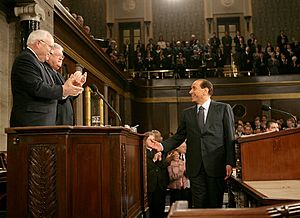
Opposition parties claim Berlusconi was not able to achieve the goals he promised in his Contratto con gli Italiani. Some of his partners in government, especially the National Alliance and the Union of Christian and Centre Democrats, admitted the Government fell short of the promises made in the agreement, attributing the failure to an unforeseeable downturn in global economic conditions. Berlusconi himself consistently asserted that he achieved all the goals of the agreement, and said his Government provided un miracolo continuo (a continuous miracle) that made all 'earlier governments pale' (by comparison). He attributed the widespread failure to recognise these achievements to a campaign of mystification and vilification in the print media, asserting that 85% of newspapers were opposed to him. Luca Ricolfi, an independent analyst, held that Berlusconi had managed to deliver only one promise out of five, the one concerning minimum pension rates. According to Ricolfi, the other four promises were not honoured, in particular the undertakings on tax simplification and crime reduction.
Subsequent elections
The House of Freedoms did not do as well in the 2003 local elections as it did in the 2001 national elections. In common with many other European governing groups, in the 2004 elections to the European Parliament, gained 43.37% support. Forza Italia's support was also reduced from 29.5% to 21.0% (in the 1999 European elections Forza Italia had 25.2%). As an outcome of these results the other coalition parties, whose electoral results were more satisfactory, asked Berlusconi and Forza Italia for greater influence on the government's political line.
Berlusconi III Cabinet
In the regional elections on 3–4 April 2005, centre-left candidates for regional presidencies won in 12 out of 14 regions where control of local governments and presidencies were at stake. Berlusconi's coalition held only two of the regions (Lombardy and Veneto) up for re-election. Three parties, Union of Christian and Centre Democrats, National Alliance and New Italian Socialist Party, threatened to withdraw from the Berlusconi government. Berlusconi after some hesitation, then presented to the president of Italy a request for the dissolution of his government on 20 April. On 23 April, he formed a new government with the same allies, reshuffling ministers and amending the government programme. A key point demanded by the Union of Christian and Centre Democrats and to a lesser extent by the National Alliance for their continued support was that the strong focus on tax reduction be reduced.
Attempt to reform the Italian constitution
A key point in the Berlusconi government's programme was a planned reform of the Italian constitution, which Berlusconi considered to be inspired by the Soviet Union, an issue on which the coalition parties themselves initially had significantly different opinions. Lega Nord insisted on a federalist reform (devolution of more power to the regions) as a condition for remaining in the coalition. The National Alliance party pushed for a strong premiership (more powers to the Prime Minister), intended as a counterweight to any federalist reform, to preserve the integrity of the nation. The Union of Christian and Centre Democrats asked for a proportional electoral law that would not damage small parties, and was generally more willing to discuss compromises with the moderate wing of the opposition.
Difficulties in negotiating an agreement caused some internal unrest in the Berlusconi government in 2003, but they were mostly overcome and the law including devolution of powers to the regions, Federal Senate, and strong premiership, was passed by the Senate in April 2004; it was slightly modified by the Chamber of Deputies in October 2004, and again in October 2005, and finally approved by the Senate on 16 November 2005, with a narrow majority. Approval in a referendum is necessary to amend the Italian constitution without a qualified two-thirds parliamentary majority. The referendum was held on 25–26 July 2006 and resulted in the rejection of the constitutional reform, with 61.3% of voters casting ballots against it.
2006 general election and opposition
Operating under a new electoral law written unilaterally by the governing parties with strong criticism from the parliamentary opposition, the April 2006 general election was held. The results of this election handed Romano Prodi's centre-left coalition, known as The Union (Berlusconi's opposition), a very thin majority: 49.8% against 49.7% for the centre-right coalition House of Freedoms in the Lower House, and a two-senator lead in the Senate (158 senators for The Union and 156 for the House of Freedoms). The Court of Cassation subsequently validated the voting procedures and determined that the election process was constitutional.
According to the new electoral rules, The Union, nicknamed "The Soviet Union" by Berlusconi, with a margin of only 25,224 votes (out of over 38 million voters) won 348 seats (compared to 281 for the House of Freedoms) in the lower house given to whichever coalition of parties was awarded more votes as a result of the majority bonus system.
This electoral law, approved shortly before the election by Berlusconi's coalition in an attempt to improve their chances of winning the election, led to the coalition's defeat and gave Prodi the chance to form a new cabinet. Prodi's coalition government consisted of a large number of smaller parties. If only one of these nine parties that formed The Union withdrew its support to Prodi, his government would have collapsed. This situation was also the result of the new electoral system.
Centrist parties such as the Union of Christian and Centre Democrats immediately conceded The Union's victory, while other parties, like Berlusconi's Forza Italia and the Northern League, refused to accept its validity, right up until 2 May 2006, when Berlusconi submitted his resignation to then President of the Republic Carlo Azeglio Ciampi.
2008 electoral victory
In the run-up to the 2006 general election, there had been talk among some of the coalition members of the House of Freedoms about a possible merger into a "united party of moderates and reformers". Forza Italia, the National Alliance of Gianfranco Fini, and the Union of Christian and Centre Democrats of Pier Ferdinando Casini all seemed interested in the project. Soon after the election, Casini started to distance his party from its historical allies. On 2 December 2006, during a major demonstration of the centre-right in Rome against the Prodi II Cabinet, Berlusconi proposed the foundation of a Freedom Party, arguing that the people and voters of the different political movements aligned to the demonstration were all part of a people of freedom.
On 18 November 2007, after claiming the collection of more than 7 million signatures (including that of Umberto Bossi) demanding that then President of the Republic Giorgio Napolitano call a fresh election, Berlusconi announced from the running board of a car in a crowded Piazza San Babila in Milan that Forza Italia would soon merge or transform into The People of Freedom, also known as the PdL (Il Popolo della Libertà). Berlusconi also stated that this new political movement could include the participation of other parties. Both supporters and critics of the new party called Berlusconi's announcement "the running board revolution" (Italian: la rivoluzione del predellino).
After the sudden fall of the Prodi II Cabinet on 24 January, the break-up of The Union, and the subsequent political crisis, which paved the way for a fresh general election in April 2008, Berlusconi, Gianfranco Fini and other party leaders finally agreed on 8 February 2008 to form the PdL joint list, allied with Lega Nord of Bossi and the Movement for Autonomy of Raffaele Lombardo.
In the snap elections held on 13–14 April 2008, this coalition won against Walter Veltroni's centre-left coalition in both houses of the Italian Parliament. In the 315-member Senate of the Republic, Berlusconi's coalition won 174 seats to Veltroni's 134. In the lower house, Berlusconi's conservative bloc led by a margin of 9% of the vote: 46.5% (344 seats) to 37.5% (246 seats). Berlusconi capitalised on discontent over the nation's stagnating economy and the unpopularity of Prodi's government. His declared top priorities were to remove piles of rubbish from the streets of Naples and to improve the state of the Italian economy, which had under-performed the rest of the eurozone for years. He also said he was open to working with the opposition, and pledged to fight tax avoidance and tax evasion, reform the judicial system and reduce public debt. He intended to reduce the number of cabinet ministers to 12. Berlusconi and his ministers (Berlusconi IV Cabinet) were sworn in on 8 May 2008.
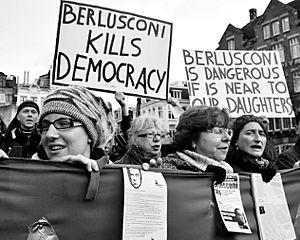
On 21 November 2008, the National Council of Forza Italia, chaired by Alfredo Biondi and attended by Berlusconi himself, dissolved Forza Italia and established the PdL, whose inauguration took place on 27 March 2009, the 15th anniversary of Berlusconi's first electoral victory.
While Forza Italia had never held a formal party congress to formulate its rules, procedures, and democratic balloting for candidates and issues, (since 1994 three party conventions of Forza Italia have been held, all of them resolving to support Berlusconi and reelecting him by acclamation) on 27 March 2009, at the foundation congress of the PdL political movement the statute of the new party was subject to a vote of approval. On 5,820 voting delegates, 5,811 voted in favour, 4 against and 5 abstained. During that political congress Berlusconi was elected as chairman of the PdL by a show of hands. According to the official minutes of the congress the result favoured Berlusconi, with 100 per cent of the delegates voting for him.
The People of Freedom split
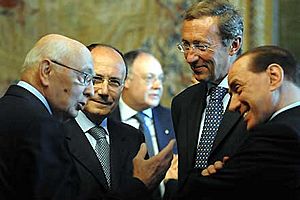
Between 2009 and 2010, Gianfranco Fini, former leader of the national conservative National Alliance (AN) and President of the Italian Chamber of Deputies, became a vocal critic of the leadership of Berlusconi. Fini departed from party's majority line on several issues but, most of all, he was a proponent of a more structured party organisation. His criticism was aimed at the leadership style of Berlusconi, who tends to rely on his personal charisma to lead the party from the centre and supports a less structured form of party, a movement-party that organises itself only at election times.
On 15 April 2010, an association named Generation Italy was launched to better represent Fini's views within the party and push for a different form of party organisation. On 22 April 2010 the National Committee of the PdL convened in Rome for the first time in a year. The conflict between Fini and Berlusconi was covered live on television. At the end of the day, a resolution proposed by Berlusconi's loyalists was put before the assembly and approved by a landslide margin. On 29 July 2010, the party executive released a document in which Fini was described as "incompatible" with the political line of the PdL and unable to perform his job of President of the Chamber of Deputies in a neutral way. Berlusconi asked Fini to step down, and the executive proposed the suspension from party membership of three MPs who had harshly criticised Berlusconi and accused some party members of criminal offences. As response, Fini and his followers formed their own groups in both chambers under the name of Future and Freedom (FLI). It was soon clear that FLI would leave the PdL and become an independent party. On 7 November, during a convention in Bastia Umbra, Fini asked Berlusconi to step down from his post of Prime Minister and proposed a new government including the Union of the Centre (UdC). A few days later, the four FLI members of the government resigned. On 14 December, FLI voted against Berlusconi in a vote of confidence in the Chamber of Deputies, a vote nonetheless won by Berlusconi by 314 to 311.
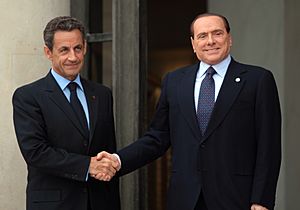
In May 2011, PdL suffered a big blow in local elections. Particularly painful was the loss of Milan, Berlusconi's hometown and party stronghold. In response to this and to conflicts within party ranks, Angelino Alfano, the Justice minister, was chosen as national secretary in charge of reorganising and renewing the party. The appointment of 40-year-old Alfano, a former Christian Democrat and later leader of Forza Italia in Sicily, was unanimously decided by the party executive. On 1 July, the National Council modified the party's constitution and Alfano was elected secretary almost unanimously. In his acceptance speech, Alfano proposed the introduction of primaries.
Resignation
On 10 October 2011, the Chamber of Deputies rejected the law on the budget of the state proposed by the government. As a result of this event, Berlusconi moved for a confidence vote in the Chamber on 14 October, he won the vote with just 316 votes to 310, minimum required to retain a majority. An increasing number of Deputies continued to cross the floor and join the opposition and on 8 November the Chamber approved the law on the budget of the State previously rejected but with only 308 votes, while opposition parties didn't participate in the vote to highlight that Berlusconi lost his majority. After the vote, Berlusconi announced his resignation after Parliament passed economic reforms. Among other things, his perceived failure to tackle Italy's debt crisis with an estimated debt sum of €1.9 trillion ($2.6 trillion) had urged Berlusconi to leave office. The popularity of this decision was reflected in the fact that while he was resigning crowds sang the hallelujah portion of George Frideric Handel's "Messiah", complete with some vocal accompaniment; there was also dancing in the streets outside the Quirinal Palace, the official residence of the President of Italy, where Berlusconi went to tender his resignation.
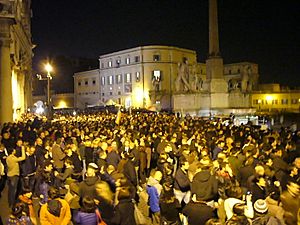
Austerity measures were passed, raising €59.8 billion from spending cuts and tax raises, including freezing public-sector salaries until 2014 and gradually increasing the retirement age for women in the private sector from 60 in 2014 to 65 in 2026. The resignation also came at a difficult time for Berlusconi, as he was involved in numerous [[Trials and allegations involving Silvio Berlusconi|trials for corruption.
Berlusconi had also failed to meet some of his pre-election promises and had failed to prevent economic decline and introduce serious reforms. Many believed that the problems and doubts over Berlusconi's leadership and his coalition were one of the factors that contributed to market anxieties over an imminent Italian financial disaster, which could have a potentially catastrophic effect on the 17-nation eurozone and the world economy. Many critics of Berlusconi accused him of using his power primarily to protect his own business ventures.
On 12 November 2011, after a final meeting with his cabinet, Berlusconi met Italian President Giorgio Napolitano at the Palazzo del Quirinale to tend his resignation. Following Berlusconi's resignation, Mario Monti formed a new government that would remain in office until the next scheduled elections in 2013. On 16 November, Monti announced that he had formed a Cabinet and was sworn in as Prime Minister of Italy, also appointing himself as Minister of Economy and Finances.
In the following years Berlusconi often expressed his point of view regarding his resignation in 2011. He accused Angela Merkel, Nicolas Sarkozy, Christine Lagarde and Giorgio Napolitano, along with other global economic and financial powers, to have plotted against him and forced him to resign, because he refused to accept a loan from the International Monetary Fund, which according to him, would have sold the country to the IMF. This theory was confirmed by the former Prime Minister of Spain José Luis Rodríguez Zapatero.
2013 general election
In December 2012, Berlusconi announced on television that he would run again to become Prime Minister of Italy. Berlusconi said his party's platform would include opposition to Mario Monti's economic performance, which he said put Italy into a "recessive spiral without end." He also told the media on the sidelines of A.C. Milan's practice session, the football club he owns along with Mediaset, the largest media outlet in the country, that he races to win. He said: "To win, everyone said there had to be a tested leader. It's not that we did not look for one. We did, and how! But there isn't one ... I'm doing it out of a sense of responsibility."
On 7 January 2013, Berlusconi announced he had made a coalition agreement (centre-right coalition) with Lega Nord (LN); as part of it, PdL would support Roberto Maroni's bid for the presidency of Lombardy, and he would run as "leader of the coalition" but suggested he could accept a role as Minister of Economy under a cabinet headed by another People of Freedom (PdL) member, such as Angelino Alfano. Later that day, LN leader Maroni confirmed his party would not support Berlusconi being appointed as Prime Minister in the case of an electoral win. Berlusconi's coalition gained 29.1% of votes and 125 seats in the Chamber of Deputies, 30.7% of votes and 117 seats in the Senate.
In April 2013, Berlusconi's PdL announced his support of the Letta government, together with the Democratic Party and the centrist Civic Choice, of former Prime Minister Mario Monti.
Refoundation of Forza Italia and public office ban
In June 2013, Berlusconi announced the refoundation of his first party Forza Italia (FI). On 18 September the new party was launched and officially founded on 16 November. After the foundation of Forza Italia, Berlusconi announced that his new party would oppose the grand coalition government of Enrico Letta; the new political position taken by Berlusconi caused dissent in the movement, and the governmental wing of Forza Italia led by Angelino Alfano split from FI and founded a Christian democratic party called New Centre-Right, which supported the Letta Cabinet.
On 1 August 2013, Berlusconi was convicted of tax fraud by the court of final instance, the Supreme Court of Cassation, which confirmed his four-year prison sentence, of which three years are automatically pardoned, along with a public office ban for two years. As his age exceeded 70 years, he was exempted from direct imprisonment; he served his sentence by doing unpaid social community work. Because he was sentenced to a gross imprisonment of more than two years, a new Italian anti-corruption law (named after Paola Severino) resulted in the Senate expelling and barring him from serving in any legislative office for six years. Berlusconi pledged to stay leader of Forza Italia throughout his custodial sentence and public office ban. He was not able to campaign for his party, and according to him this was the main reason for declining opinion poll numbers, which are putting the party steadily in fourth place, behind the Democratic Party, the Five Star Movement and FI's long-time coalition partner Lega Nord.
In March 2017, Berlusconi expressed his intention to run once again as centre-right candidate for the premiership, even if he is banned from public office until 2019; the 2018 Italian general election was his seventh one as the centre-right frontunner. The general election resulted in Lega per Salvini Premier winning more seats than FI, and no electoral coalition winning an outright majority.
Political comeback and election to European Parliament
In January 2019, Berlusconi expressed his intention to run for candidacy in the 2019 European Parliament election in Italy. In the election, Forza Italia received only 8.8% of votes, the worst result in its history. Berlusconi was elected in the Parliament, becoming the oldest member of the assembly. He was a potential nominee in the 2022 Italian presidential election, which was ultimately won by Sergio Mattarella. From 2019 to 2022, Berlusconi had the lowest attendance rate among MEPs with 59%, largely because of months of dealing with symptoms after catching COVID-19 in September 2020.
Foreign policy
Berlusconi and his cabinets had a strong tendency to support American foreign policies, despite the policy divide between the U.S. and many founding members of the European Union like Germany, France, and Belgium during the George W. Bush administration. Under Berlusconi's lead, the Italian Government also shifted its traditional position on foreign policy from being the most pro-Arab Western government, towards a greater friendship with Israel and Turkey than in the past. This resulted in a rebalancing of relations between all the Mediterranean countries, to reach equal closeness with them. Berlusconi is one of the strongest supporters of Turkey's application to accede to the European Union. To support Turkey's application the Italian Premier invited Prime Minister Erdoğan to take part in a meeting of the European leaders of Denmark, France, Germany, the Netherlands, Spain, Sweden, and the United Kingdom, gathered in L'Aquila for the 2009 G8 summit. Italy, with Berlusconi in office, became a solid ally of the United States due to his support for the war in Afghanistan and the Iraq War following the 2003 invasion of Iraq in the war on terror. On 30 January 2003, Berlusconi signed "The letter of the eight" supporting the U.S. preparations for 2003 invasion of Iraq.
Berlusconi, in his meetings with United Nations Secretary-General Kofi Annan and U.S. President George W. Bush, said that he pushed for "a clear turnaround in the Iraqi situation" and for a quick handover of sovereignty to the government chosen by the Iraqi people. Italy had some 3,200 troops deployed in Southern Iraq, the third largest contingent there after the American and British forces. When Romano Prodi became Prime Minister, Italian troops were gradually withdrawn from Iraq in the second half of 2006 with the last soldiers leaving the country in December of that year.
Berlusconism
Berlusconismo (English: Berlusconism) is a term used in Italian media and political analysts to describe the political positions of Berlusconi.
Origins and features
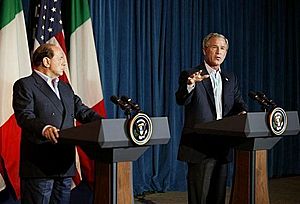
The term "Berlusconismo" arose in the 1980s, with a strongly positive meaning, as a synonym for entrepreneurial optimism, that is, as an entrepreneurial spirit which is not shaken by difficulties, and believes that problems can be solved. However, in the 21st century, the meaning has changed.
According to the Italian definition given by the online vocabulary of the Encyclopedia Institute, Berlusconismo has a wide range of meanings, all having their origins in the figure of Berlusconi, and the political movement inspired by him: the "thought movement", but also to "social phenomenon", and, even, the phenomenon "of custom" bound to his entrepreneurial and political figure.
Political positions
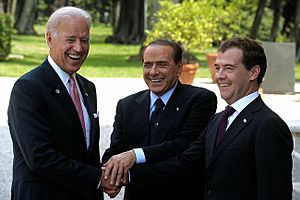
Berlusconi defined himself as moderate, liberal, and a free trader, but he is often also described as a populist or a conservative. After his resignation in 2011, Berlusconi became increasingly Eurosceptic, and he was often critical of German Chancellor Angela Merkel.
One of Berlusconi's main leadership tactics was to use the party as an apparatus to reach power. This is decidedly comparable to the political tactics used by Charles De Gaulle in France. Another feature of great importance was emphasis on a "liberal revolution", summarised by the "Contract with the Italians" of 2001.
Death
Having been hospitalized again on 9 June 2023, Berlusconi died on 12 June 2023 at San Raffaele Hospital in Milan.
Honours and awards
 Italy: Knight of the Order of Merit for Labour (1977–2014); Berlusconi voluntarily resigned from this order on 18 March 2014.
Italy: Knight of the Order of Merit for Labour (1977–2014); Berlusconi voluntarily resigned from this order on 18 March 2014. Holy See: Knight Grand Cross of the Order of Pius IX (2005)
Holy See: Knight Grand Cross of the Order of Pius IX (2005) Poland: Grand Cross of the Order of Merit of the Republic of Poland (2002)
Poland: Grand Cross of the Order of Merit of the Republic of Poland (2002) Latvia: Grand Officer of the Order of the Three Stars (2005)
Latvia: Grand Officer of the Order of the Three Stars (2005) Libya: Recipient of the Al-Fateh Medal (2009)
Libya: Recipient of the Al-Fateh Medal (2009) Malta: Honorary Companion of Honour of the National Order of Merit (2004)
Malta: Honorary Companion of Honour of the National Order of Merit (2004) Norway: Grand Cross of the Royal Norwegian Order of Merit (2001)
Norway: Grand Cross of the Royal Norwegian Order of Merit (2001) Romania: Grand Cross of the Order of the Star of Romania (2002)
Romania: Grand Cross of the Order of the Star of Romania (2002) Saudi Arabia: Member 1st Class of the Order of Abdulaziz al Saud (22 November 2009)
Saudi Arabia: Member 1st Class of the Order of Abdulaziz al Saud (22 November 2009) House of Bourbon-Two Sicilies: Knight Grand Cross of the Sacred Military Constantinian Order of Saint George
House of Bourbon-Two Sicilies: Knight Grand Cross of the Sacred Military Constantinian Order of Saint George
See also
 In Spanish: Silvio Berlusconi para niños
In Spanish: Silvio Berlusconi para niños
- Forbes list of billionaires (2011)
- List of Italian Prime Ministers by time in office#Italian Republic (1946–present)
- List of longest-serving G8 leaders


